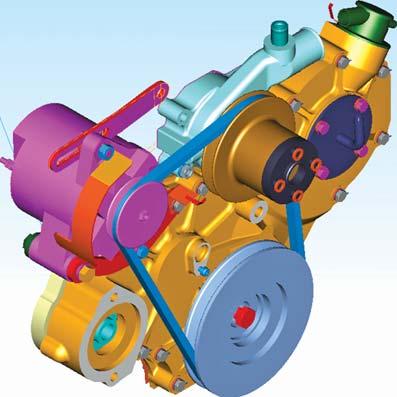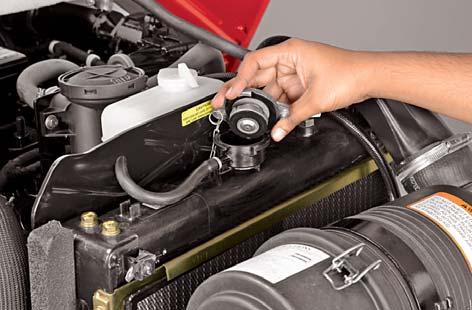
2 minute read
Cooling System
Water Pump
The water pump is provided with a sealed bearing. Adjusting or greasing will not be necessary.
Hose Connections
Check periodically to ensure all the connections are in good order and the clips are tight. A leaking connection results in loss of coolant and thus engine efficiency. When using antifreeze in the cooling system, it is absolutely essential to have efficient connection so check these and should there be any doubt as to their serviceability, renew.
Fan & Fan Belts
A 6 Blade plastic fan is mounted on water pump and is driven vide fan belt by the main drive crank pulley. While the engine is in operation, the fan draws air through the radiator core.

Slippage of belt on pulley can cause over heating. The Fan belts shall always be dry and free from oil or Grease. Incorrect belt tension results in its rapid wear. Crank pulley is assembled on crank shaft.
Belt Adjustment
To adjust belt tension, loosen the alternator on the adjustable bracket and lock the bolt in the location that gives correct belt tension (270-310 N) such that the belt can be depressed without much effort by the thumb, 0.25 to 0.4 inch.
Belt Removal
1.Loosen the Bolt (C).
2.Push the alternator down.
3.Ease the fan belt off the alternator pulley.
4.Ease the fan belt off the main drive pulley.
5.Slide out the belt from water pump pulley over the fan blades.
Belt Replacement
Reverse the procedure of fan belt removal stated above. Adjust the fan belt tension as previously detailed.
Draining the System
Two drain plugs must be opened. One is on LH side of crankcase and one on radiator bottom tank. To speed up draining, remove the radiator cap. Ensure that the drains are not clogged. Close the taps after draining is complete.
Cleaning out Dirt and Sludge
Drain cooling system as directed above. Fill the cooling system with a solution of 1.0 Kg. of ordinary baking soda to 7.0 litres (1.84 US Gallons) of water. Do not replace the radiator cap. Operate the engine until the coolant is hot. Drain, flush with clean water and refill with a rust inhibitor or anti-freeze solution.
A.Alternator Mounting
B.Alternator
C.Adjusting Bolt
D.Adjusting Bracket
Adding Coolant to the System
Allow the engine to cool if it is hot.
1.Open the Hood.
2.Remove the radiator cap.
3.Fill the radiator from fill neck (A) with clean coolant upto a level approx. 2" below the radiator neck.
4.Start the engine and let it idle to remove air from the system. Coolant level in radiator will reduce.
5.Slowly pour coolant into the radiator till the coolant level in radiator does not go down further.

6.Fill coolant in surge tank from fill neck (B) upto the Max level mark.
7.Refit the radiator cap.
8.Shut down the Engine.
9.Close the Hood.
Ensure that the filler cap is clean and free of dirt particles before replacing.
Cooling System Protection
A common cause of the engine overheating is a rust clogged cooling system. Rust causes overheating by interfering with circulation and cooling. The tractors are filled with a mixture of new low silicate antifreeze (50% - antifreeze - 50% water) with a rust inhibitor in it. Use of approved supplemental corrosion inhibitor along with ethylene glycol will add increased rust prevention, reduce scale formation, minimize cylinder wall erosion & reduce foaming or tendency to foam.
Antifreeze : There are numerous antifreeze products marketed today. Diesel engines are adversely affected by the additives added to protect the aluminum surfaces. Antifreeze suitable for diesel engines conforms to an industry recognised standards which limits silicates to 0.1%. Once silica-gel has formed it is very difficult and costly to remove.
We are listing below some low silicate antifreezes that meet GM 6038 M formulation specification. There may be other suppliers who can make available low silicate antifreezes.

No.CompanyProduct
1Texaco (1)2354 / 2055 Startex (Was JC-04)
2BASF WYANDOTTE241-7
3ShellShellZone-LS
4International HarvesterI.H. Antifreeze
5Old Water TradingFull Force
6ConocoFleet Antifreeze
7Northern PetrochemicalAll Weather (NPC 220)





